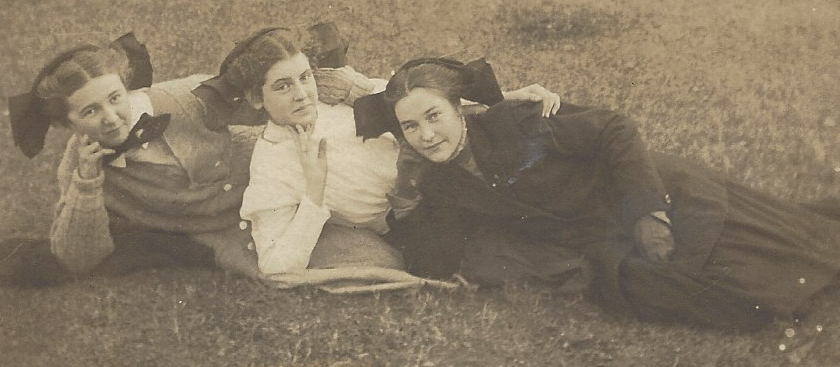
Sick, stressed, tired, anxious – these physical and mental states are all too common as we enter the second year of the 2020s. What to do? Self care takes many forms but, as generations of Kentuckians tell us, some of them never change.
They can be as simple as Arthur Milem’s plan for decompressing when he returned to Covington after his World War I service in France. “I am going to do nothing,” he declared in a letter to his girlfriend, “but eat and sleep for a month.” For Bowling Green’s Sallie McElroy, worrying about her fiancee in Missouri and restlessly awaiting their marriage, her chronic headaches and blues could be relieved during the winter of 1858 with a walk along her beloved Drakes Creek. There, this lover of nature found herself heartened at the thought of spring. “Soon the birds will be warbling on every bough – the sweet flowers will awaken from their long, cold sleep, & the bright glad sunshine will play on the hilltops all day long!” she rhapsodized in her journal, the writing of which was itself a way of collecting her thoughts.
And who hasn’t felt invigorated after a long soak in the tub? Even in 1830, when bath water came cold from the spring, Rebecca Condict wrote her sister-in-law Mary in Ohio County that a gentle dousing would work wonders. “You must commence at your head,” she instructed. “Put it on with your cloth or pour it on if you can stand it,” and “have some one to rub your back where you can’t rub.” Even if bathing didn’t cure Mary’s ills, she counseled, “it will make you feel very warm for a while.”
Those desiring more formal therapy could, like WKU Director of Libraries Margie Helm, pursue a regimen prescribed by a professional. In 1960, she received an encouraging letter from Dr. Edmund Jacobson, a director of Chicago’s Foundation for Scientific Relaxation, after she reported favorably on her progress in combatting fatigue, insomnia and social anxiety. (In addition to Jacobson, who pioneered the techniques of progressive muscle relaxation and biofeedback, the Foundation’s Board included meat and cold cut king Oscar Mayer – a nice example of synergy, comfort food lovers might say).
That the mind possessed its own healing powers was the belief of Virginia Edmunds, who in letters to her sister Laura in Barren County in the 1910s mentioned such up-to-date balms for the soul as yoga, meditation and holistic health. Grateful for the “good Karma” that had settled upon her home in San Diego, she reflected on the wisdom of living in the moment. “We have wished, at times,” she wrote, “for Aladdin’s lamp or for a magic ring, or for a rug on which we could be wafted away to lands of our heart’s desires. Yet we all have a lamp and ring and rug – only, we do not use them. The world is full of delights which are ours for the asking – but, we do not ask.”
Click on the links to access finding aids for collections containing these materials, part of the Manuscripts & Folklife Archives of WKU’s Department of Library Special Collections. For more collections, search TopSCHOLAR and KenCat.

